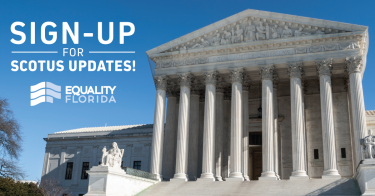U.S. Supreme Court To Make Major Decision on LGBTQ Civil Rights
TALLAHASSEE, FL — Today the U.S. Supreme Court announced it will review three cases regarding whether federal nondiscrimination law applies to LGBTQ people. Numerous cases have held that under Title VII of the Civil Rights Act of 1964, discrimination against people based on sexual orientation and gender identity is sex discrimination and violates federal law. With these cases, R.G. & G.R. Harris Funeral Homes v. EEOC & Aimee Stephens, Bostock v. Clayton County, and Altitude Express, Inc. v. Zarda, the Court will now decide whether to uphold non-discrimination protections for LGBTQ people - or take them away.
“This country’s values are rooted in the belief that all people are created - and should be treated - equally,” said Jon Harris Maurer, Equality Florida Public Policy Director. “No one should fear being fired or face discrimination because of who they love or who they are. Federal courts have affirmed time and again that discrimination against the LGBTQ community is against the law. The Supreme Court now has the opportunity to solidify those protections and reaffirm that all people should be free to work and live without fear of discrimination. That there is still a gray area for these civil rights to be challenged is further evidence that Florida lawmakers must pass the Florida Competitive Workforce Act to make clear that Florida is open to all and will not allow discrimination.”
In Bostock v. Clayton County, a county child welfare services coordinator was fired when his employer learned he is gay. In May 2018, the Eleventh Circuit Court of Appeals refused to reconsider a 1979 decision wrongly excluding sexual orientation discrimination from coverage under Title VII’s ban on sex discrimination, and denied his appeal.
In Altitude Express Inc. v. Zarda, a skydiving instructor was fired from his job because of his sexual orientation. A federal trial court rejected his discrimination claim, saying that the Civil Rights Act does not protect him from losing his job for being a gay man. In February 2018, the full Second Circuit Court of Appeals ruled that discrimination based on sexual orientation is a form of sex discrimination prohibited under Title VII. The court recognized that when a lesbian, gay, or bisexual person is treated differently because of discomfort or disapproval that they are attracted to people of the same sex, that constitutes discrimination based on sex.
In R.G. & G.R. Harris Funeral Homes v. EEOC & Aimee Stephens, a funeral home owner fired a funeral director after the director informed the owner that she is transgender and planned to come to work as the woman she is. The owner said it would be "unacceptable" for her to appear and behave as a woman. The Sixth Circuit Court of Appeals ruled in March 2018 that firing her for being transgender and departing from sex stereotypes violated Title VII, the federal law prohibiting sex discrimination in employment.
While the Court considers these cases, with decisions expected in the summer of 2020, the Florida legislature must immediately act to resolve uncertainty in civil rights protections for the LGBTQ community. The Florida Competitive Workforce Act is now co-sponsored by a record 73 lawmakers, signaling loudly that there is broad bipartisan support for ensuring all Floridians have the same protections. This legislation has received support from the business community and faith leaders. Polls show that nearly 75% of Floridians support fully inclusive laws that protect LGBTQ people from discrimination. The Florida legislature must make passing the Florida Competitive Workforce Act a top priority and set a national tone of equality for all.


